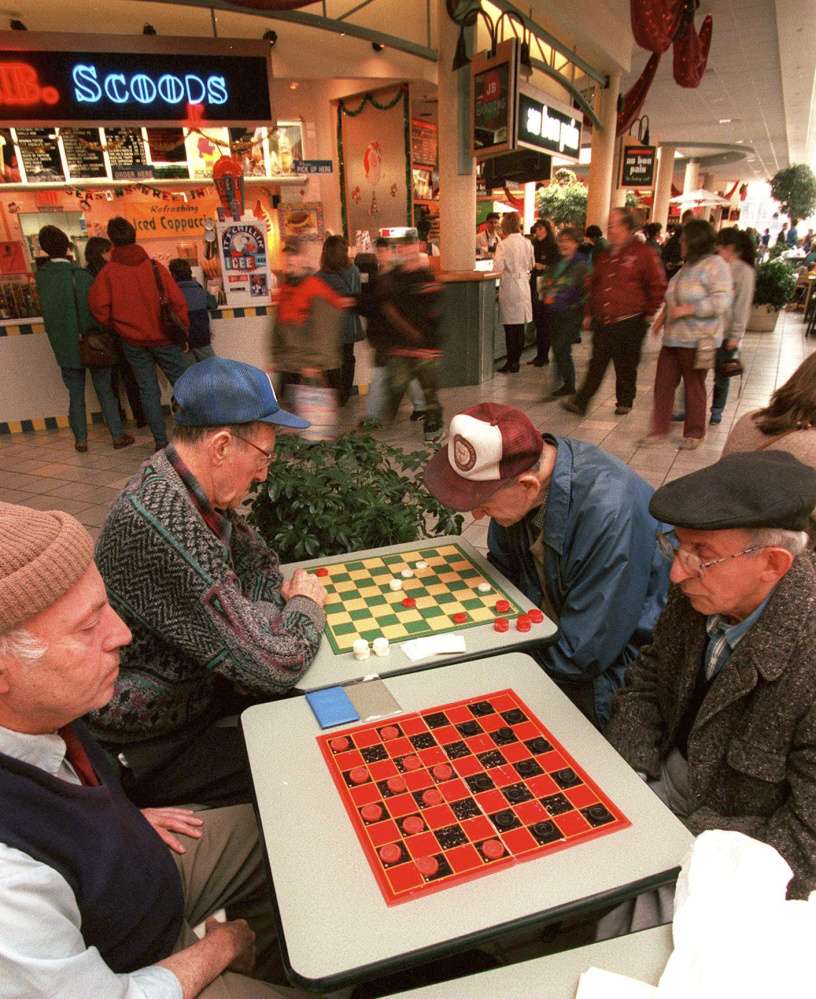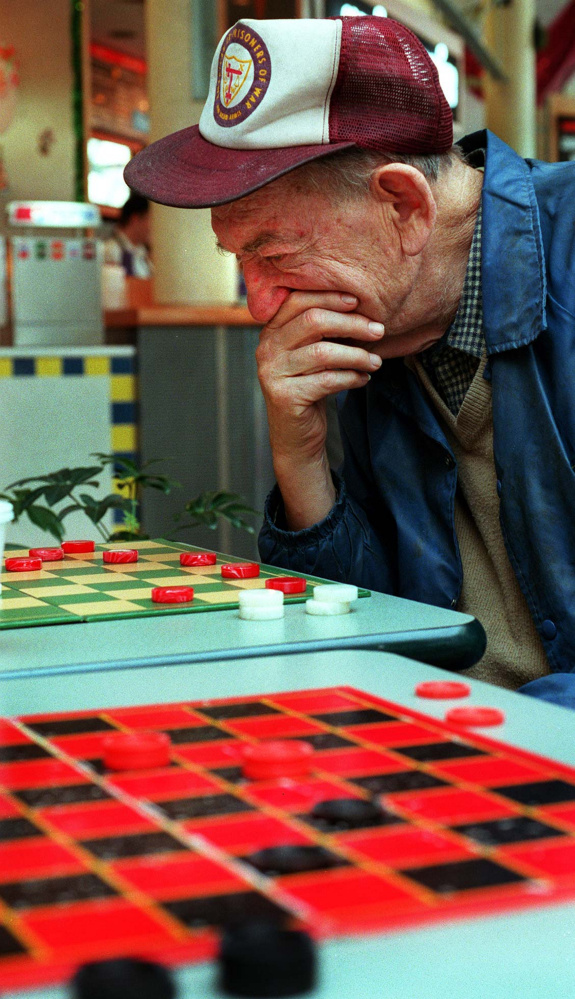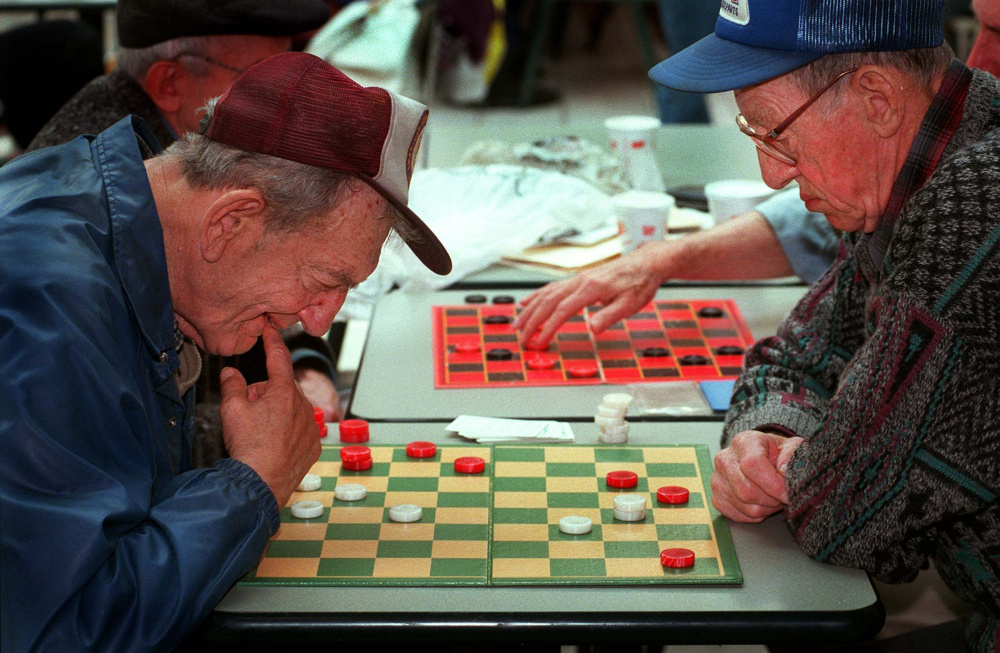Shoppers swirled around the food court of the Maine Mall, scurrying onward, barely glancing at the four older men hunched over their checkerboards. Canned music floated above the din, but the men remained transfixed, hands on jowls or chins except for an occasional reach to slide a piece forward.
Nate Cohen hunched over the green and tan squares – red and black is for beginners – and peered into the future. The casual player sees today. Cohen sees two weeks from Tuesday.
It is why chess, seemingly more complex, never grabbed him the way checkers did.
“In chess, you can make one mistake after another and still come out on top, ” Cohen said. “In checkers, one mistake and you lose.”
Checkers has a hold on Cohen and a handful of his contemporaries. To them, the game is part art and part science. Simple elegance. It takes minutes to learn, more than a lifetime to master.
The Pressman Toy Corporation, which turns 75 this year, has manufactured 25 million checkers sets. Parker Brothers reports sales are as strong as ever. If there’s not a checkerboard in your home, then surely your folks have one.
But those who know how to use that board well are dwindling. The men who would be kings keep alive their culture on Saturday mornings at the mall, but they fear that when they die, their game will die with them.
Cohen will not go down without a fight. He chewed on a cuticle as his opponent, Rodney Scoville, stared at the board from behind thick glasses, elbows resting on the table.
How many times had they assumed this same position, facing each other across 64 small squares, half of them invisible? Thousands. Heck, tens of thousands. For a while they would start after breakfast and not stop until supper.
Cohen is 77, Scoville 81. But the game, it never gets old.
Oh sure, life gets in the way for some, like Don Dow of Falmouth and Walt Stover of Westbrook. They played checkers in its heyday, when the Portland YMCA would have 20 games going at once and the Evening Express ran a regular checkers column. But wives and children and careers intervened, and they only recently returned to the game after decades away from it.
“I’ve got something I’d like to show you, ” said Dow, reaching into a plastic bag and pulling out a paperback book. The book showed a black-and-white pictorial history of Scarborough. On the cover, in sepia tones, was a scene from a general store, the O.E. Sherman & Son General Store of North Scarborough.
“That’s my grandfather, ” Dow said, pointing to a man wearing a pin-striped suit and plucking a can from a shelf. “And that’s my Uncle Joe, ” he said, pointing to man, seated on a crate, engaged in a serious – if the presence of five rubber-necking onlookers can be trusted – game of checkers.
Dow turned 85 last week. His grandfather’s store closed in 1982. Serious checkers may soon follow, with no heirs apparent.
“This group, ” Dow said with a nod to his companions, “when we die, I don’t know whether there will be anybody to continue the game. Seriously, I mean. And that’s too bad. Because it’s a good game.”
Nationwide, membership in the American Checkers Federation, once in the thousands, has dropped below 800. Maine has about 15 members, says ACF president Lester A. Balderson.
“Checkers is a tremendously deep game, ” said Stover, who’s 63. “People don’t realize that, because any kid can play it. But it takes a tremendously intelligent person to play it well. If you doubt Stover, show up at the mall some Saturday and challenge any of the regulars – Cohen, Scoville, Dow, Stover or Warren Braveman, a great-uncle-come-lately who sought out the masters in hopes of holding off a precocious nephew.
Cohen, Maine’s most ardent checkers promoter – he once gained entry into the Guinness Book of World Records by playing and beating 172 opponents, bunches at a time, at an afternoon picnic in Brunswick – offers baseball cards to any kid who can beat him. For adults, the prize is postcards.
Checkers has been a lifelong pursuit for Cohen, who grew up on Union Street and now lives in a Park Avenue apartment. He often wears a faded maroon-and-white baseball cap whose letters read “American Prisoner of War.”
He learned the game as a 12-year-old in 1931. It was the Depression, and checkers provided cheap entertainment. He played at the Boys Club and then at the Y, where a barnstorming world champion named William F. Ryan noticed his potential during a multi-game exhibition.
“He saw the interest I had, and he kept going around the board, saying he needed more time, ” Cohen said. “He probably could have beaten me easily, but he made me one of the last players to finish that night.”
The regular players at the Y noticed, and they all wanted to play the upstart kid. In 1942, Cohen ended the three-decade state championship reign of Ray Gould, the best player Maine ever produced. Later, while stationed at Fort Benning, Ga., Cohen beat the Georgia state champion.
In France, as part of the Normandy Invasion, Cohen caught shrapnel in his leg and was captured after his battalion lost air cover and a high tide cut off an escape route.
“We had to just stand there and take it, ” he said. “It was terrible. A lot of them died.”
He spent 11 months in a German POW camp and shrunk from 196 pounds to 96. Another prisoner happened to be a Russian checkers champion. A board was procured and Cohen won the match, claiming as his prize four slices of bread.
Back home in Portland, Cohen presided over the 150-member Maine Checkers Association. He gave exhibitions, sometimes blindfolded (the squares are numbered for reference, and for publishing purposes). As a postal worker on mail trains, he took on all comers.
A co-worker’s cousin once visited from North Carolina and heard of Cohen’s prowess. A match was arranged.
“I hope you’re a good loser, ” said the confident visitor.
“Well, I don’t know, ” Cohen replied. “I never lose.”
The only thing Cohen couldn’t beat was television. It kept folks home at night and sapped checkers of new blood.
“People stopped coming to the checkers clubs, ” said Stover, a three-time New England junior champion. “And with the older players dying out, there were no new ones coming up to replace them.”
IN TOURNAMENT CHECKERS, the first three moves are selected at random from a special deck of cards. Otherwise a player could simply study one line of play, learn it inside out, and nearly always achieve at least a draw.
With 137 possible openings, serious players needed to study them all. Stover amassed a library of two dozen books. Cohen collected even more.
But with tournaments and interest dwindling, there seemed no reason to study. Stover got married and took a 20-year hiatus. He sold all but one of his books.
Dow, who accompanied his Uncle Joe on weekly forays into Portland for checkers at the Y, moved to Massachusetts and became a superintendent of schools.
“For 30 years, I did not play checkers at all, ” he said.
None of the old guard can remember when the last state tournament was held, formerly a New Year’s Day tradition at the Y. Even so, Cohen continued to beat the checkers drum, in schools, synagogues and church fairs. He and Scoville continued to meet regularly to quench their thirst for competition.
They would play in Scoville’s apartment, five and six hours at a stretch, every day. It never got tiring, not even after a dozen draws in a row.
“We liked to beat each other so bad, ” Cohen said. “One time I beat him and he got up and slammed the door.”
Scoville had come down from Lubec in 1942 to work in the shipyards. After a 10-year stint in Connecticut, where he became that state’s checkers champion, he returned to Maine, where he ran an Esso station on Commercial Street and raised hunting beagles.
“I can’t quite explain it, ” he said of his fascination with the game. “All I know is, looking at the board, I can see a dozen different ways you could make a mistake.”
Scoville has tried to pass on the game to his great grandson: “He likes it, although he didn’t like it too well when I beat him blindfolded.”
AFTER STOPS, in apartments, back porches and occasionally the Salvation Army headquarters on Cumberland Avenue, the best checkers game in town has migrated to the mall. Dow, who has outlived two wives, strolled by one Saturday and remembered Cohen from the Y. Scoville rekindled Stover’s interest and, suddenly, Saturdays in the food court became a staple.
Last May, the group traveled to Melrose, Mass., to compete against a team from the Greater Boston Checkers Conference. The Mainers won. The regional ACF rep sensed renewed interest in Maine and offered Cohen a chance to host the New England tournament in Portland, if he could gather at least eight local players.
Cohen shook his head sadly. “I can’t guarantee we could get eight players, ” he said.
The horizon is not all bleak. Braveman recently joined the group because his sister’s grandson was beating everyone else in the family.
“It’s a good opportunity while they’re still around, ” Braveman said of his mentors, “to learn checkers well.”
In November, a guy in his 30s showed up, took two games off Braveman, had a 6-to-5 edge on Scoville before being suckered into a double jump, and split games with Dow. Cohen administered an appropriate comeuppance, but still, here was potential. Perhaps the torch could be passed.
The fellow returned only once in ensuing weeks. Bachelors, it turns out, make the best checkers players.
“We’ve been disappointed a lot, ” Cohen said. “There’s not many good players out there. A lot of false hopes.”
In Amazon rainforests, scientists seek shamans with knowledge of medicinal herbs on the brink of extinction. Here in Portland, you need only take a seat in the mall on a Saturday morning. The elders are more than willing to share.
“When these guys pass away, I think the game will be gone for good around here, ” Stover said. “In any sport, you’ve got to get those rookies coming up to replenish the stock. We just don’t have that here. It makes me feel kind of sad, because it’s such an outstanding game.”
Glenn Jordan can be contacted at 791-6425 or
Twitter: GlennJordanPPH
(Editor’s note: This story originally appeared in the Jan. 12, 1997 Maine Sunday Telegram)
Send questions/comments to the editors.





